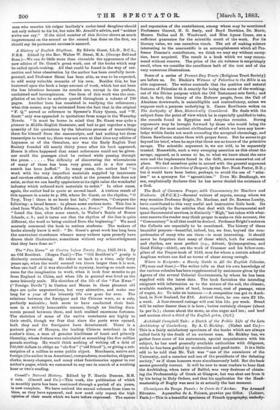Some of a series of Present-Day Tracts (Religious Tract Society)
are before us. Dr. Blaikie's Witness of Palestine to the Bible is an able argument. The writer contends that the position and natural features of Palestine fit it exactly for being the scene of the working- out of the Divine purpose which the Old Testament sets forth; and that, in fact, the history of the Hebrew people, from the Call of Abraham downwards, is unintelligible and contradictory, unless we suppose such a purpose underlying it. Canon Rawlinson writes on The Antiquity of Man, Historically Considered. He deals with the subject from the point of view which he is especially qualified to take, the records found in Egyptian and Assyrian remains. Strong arguments may be brought forward by those who would bring the history of the most ancient civilisations of which we have any know- ledge within limits not much exceeding the accepted chronology, and Canon Rawlinson states them with proper force. But he seems to go beyond his brief, when he says that there are no traces of the primitive savage. The scientific argument is, we are told, to be separately treated. Meanwhile, such a very sweeping assertion as this about the savage, opposed, as it seems to be, to what we know about the cave men and the implements found in the drift, seems somewhat out of place. We find ourselves quite in accord with the general argument of Agnosticism : a Doctrine of Despair, by the Rev. Noah Porter, D.D. ; but it would have been better, perhaps, to avoid the use of " athe- ism" as a synonym for " agnosticism." Even Mr. Bradlaugh, we see, emphatically declares that he has never denied the existence of a God.


































 Previous page
Previous page